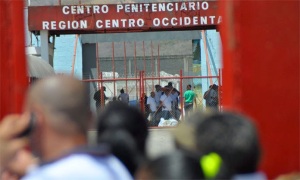Aftermath in Uribana: Few answers, no closure


 It has been three weeks since the start of the Uribana Prison crisis, and two since its sadly tragic conclusion. To this date, 48 inmates have died. There’s already a new warden in charge, along with 300 new guards.
It has been three weeks since the start of the Uribana Prison crisis, and two since its sadly tragic conclusion. To this date, 48 inmates have died. There’s already a new warden in charge, along with 300 new guards.
Until now, the official version remains the same: the inmates committed suicide by ingesting a combination of medication found in the prison’s infirmary, and alcohol. This was repeated during a TV interview by the head of the National Assembly’s Prisons Commission, chavista turncoat William Ojeda.
But some of the relatives of the deceased believe they were downright killed. The sister of one of them told Barquisimeto newspaper El Impulso that “…they were given the death penalty,” and that the Prisons Ministry refused to move his brother to a better hospital in Zulia State because he spoke ill of the government.
The former warden Julio Cesar Perez (whose treatment of inmates triggered the crisis) and twelve prison guards will be charged in court, yet it remains to be seen how this will match the official version of events. Prisons Minister Iris Varela has kept a low profile in recent days, but she came earlier in the week to Barquisimeto and apologized to the inmates’ relatives. Both the opposition and human rights groups have demanded her firing. She pushed back by attacking her critics and specially what she calls the “…malicious disinformation campaign that worships death.” (Does that mean us?)
In the last five years alone, more than 200 inmates have died inside Uribana Prison, and 700 have been injured, but even this can’t change the situation of our prison system. As Human Rights Watch Director for the Americas, Jose Miguel Vivanco asked “[h]ow many deaths have to occur so the Venezuelan government tackles the prison crisis seriously?”.
The answer remains unknown. Shockignly, so does the answer to another question: does the State knows where its prisoners are?
Caracas Chronicles is 100% reader-supported.
We’ve been able to hang on for 22 years in one of the craziest media landscapes in the world. We’ve seen different media outlets in Venezuela (and abroad) closing shop, something we’re looking to avoid at all costs. Your collaboration goes a long way in helping us weather the storm.
Donate




